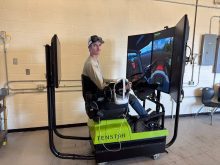NEW APPROACH Nutrition is key to a “wellness-based health system” and that includes limiting people’s consumption of red and processed meat
Just over half of adult Canadians are obese or overweight, and experts say deaths caused by obesity-related health issues will soon exceed those caused by tobacco use.
The situation is even worse in the U.S. where nearly three-quarters of Americans are obese, but despite the grim prognosis, obesity intervention still isn’t part of routine patient care, says the president of the Canadian Nutrition Society.
“There are no protocols,” said Dr. Leah Gramlich, a gastroenterologist and associate professor in the Faculty of Medicine at the University of Alberta.
Read Also

Farming Smarter receives financial boost from Alberta government for potato research
Farming Smarter near Lethbridge got a boost to its research equipment, thanks to the Alberta government’s increase in funding for research associations.
“There is no mandate that health officials have. It’s up to the faculties to determine the curriculum. The bar has been very low and that’s what we’re targeting.”
But it’s not just how much people eat, but what’s in their diet, Gramlich told attendees at Future Fare, an annual event hosted by the Alberta Livestock and Meat Agency.
Gramlich applied for an ALMA grant for Wellness RX, an initiative being undertaken by her university to train Alberta health-care professionals about the role of a healthful diet — a diet which includes meat, dairy and eggs.
“I’m aware of the limitations or implications of meat and processed meats for health — the American Institute of Cancer Research has just said that choosing more red meat more often is associated with an increase in cancer risk of XYZ percentage,” said Gramlich, who is also a medical director for nutrition services for Alberta Health Services.
However, health-care professionals and the public need facts and context.
“I live in Alberta, and I like meat,” she said. “I can talk about the health attributes of beef and not feel conflicted. It’s a great source of bio-available iron and in my practice, I see a lot of iron deficiency. It’s a really good source of lean protein, highly bio-available fuel and low fat. It’s not about selling more meat, it’s about debunking myth and empowering the public and health-care professionals through credible knowledge.”
Along with educating health-care professionals about the risks of obesity, Wellness RX will provide training on overall sound nutrition and exercise to reduce the risk of obesity, but also diabetes and cardiovascular incidents caused by high sodium.
Wellness not illness
The program is designed to be a ‘grassroots strategy to facilitate shift from an illness-based health care system to a wellness-based health system’ and it’s expected that about 1,000 students training to become health-care professionals will go through it annually.
People will increasingly expect and demand preventative medicine rather than reactive treatment, she said.
“We want to grow that enhanced knowledge and capacity for the public so they demand that information and that we put it in a place where it’s accessible, transparent, believable, and highly credible,” said Gramlich. “And how do we create a community movement that expects it, so that as a group we all ask what we could be doing with respect to our diet and activity to decrease our burden on the health-care system when we’re 80?”
Food processors need to be part of that effort, she said.
“I think that each part of this chain has accountability and responsibility and that we need to work together,” said Gramlich.
“I don’t think that any one portion can be vilified. I think there are health issues that relate often to processed, packaged and preserved foods, and on the one hand from a convenience and societal perspective, those foods meet a lot of the needs of our society as we evolve. On the other hand, they may contribute to poor health outcomes.”
It’s rare for a modern family to have someone at home to prepare meals — and that’s true in her home, said the mother of two.
“I am cognizant of when we choose packaged, processed, preserved foods — I do try to choose them less,” she said.














